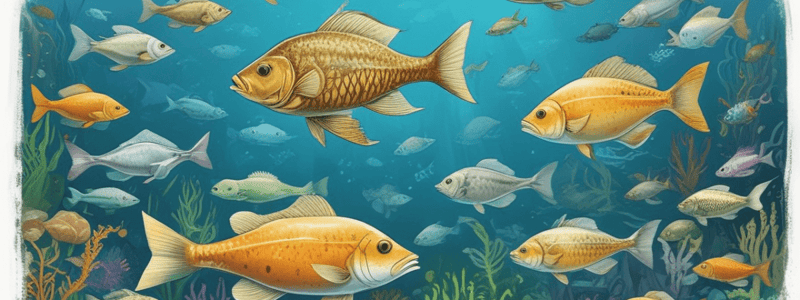Podcast
Questions and Answers
What is the top producing region of tilapia in the Philippines?
What is the top producing region of tilapia in the Philippines?
Laguna de Bay
What is the difference between indigenous and introduced species?
What is the difference between indigenous and introduced species?
Indigenous species are native to a specific region, while introduced species are brought from other regions.
What is the difference between native and endemic species?
What is the difference between native and endemic species?
Native species occur naturally in a region, while endemic species are native to a specific place and are not found elsewhere.
Differentiate arborescent and labyrinth organ.
Differentiate arborescent and labyrinth organ.
Differentiate pen and cage culture.
Differentiate pen and cage culture.
What is crude protein (CP)?
What is crude protein (CP)?
What is the coverage of GAqP?
What is the coverage of GAqP?
Differentiate lotic and lentic environments.
Differentiate lotic and lentic environments.
What is the English and scientific name of Ludong?
What is the English and scientific name of Ludong?
What country in the world constructed a monument honoring the mosquito fish for eradicating malaria?
What country in the world constructed a monument honoring the mosquito fish for eradicating malaria?
Flashcards are hidden until you start studying
Study Notes
Tilapia Production
- The top producing region of tilapia in the Philippines is the Central Luzon area.
Species Differences
- Indigenous species refer to organisms that originated and evolved in a specific region, while introduced species are those brought from other regions by human activity.
- Native species are naturally occurring in a region, while endemic species are native and restricted to a particular geographic area.
Morphological Differences
- Arborescent organ: A type of structure resembling a tree; often found in certain aquatic organisms.
- Labyrinth organ: A specialized respiratory structure found in some fish that enables them to absorb oxygen from the air.
Aquaculture Methods
- Pen culture involves raising fish in enclosed areas within a body of water, where water flows freely, allowing for exchange within the aquatic environment.
- Cage culture entails enclosing fish in floating cages, offering controlled environments while still connected to natural water.
Protein Measurement
- Crude protein (CP) refers to the total protein content in feed, including both digestible and indigestible fractions.
Regulatory Coverage
- Good Aquaculture Practices (GAqP) cover the nurturing and management practices in aquaculture to promote sustainable production.
Aquatic Environments
- Lotic environments are moving water ecosystems such as rivers and streams.
- Lentic environments are still water ecosystems like lakes and ponds.
Fish Species Details
- Ludong, commonly known as “Ludong” in English, is scientifically named Chanos chanos.
Malaria Eradication Recognition
- The country that constructed a monument honoring the mosquito fish for its role in eradicating malaria is Italy.
Studying That Suits You
Use AI to generate personalized quizzes and flashcards to suit your learning preferences.




